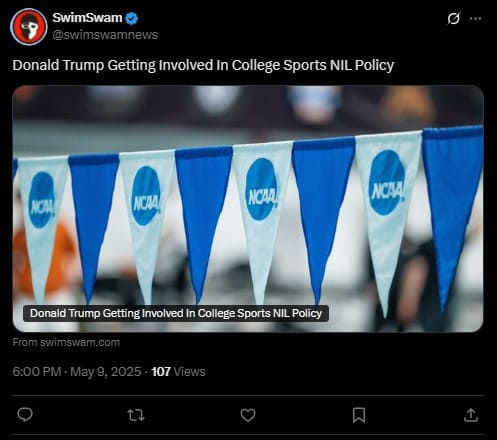Former President Donald Trump is diving into a hot topic in college sports — the NIL (Name, Image, and Likeness) policy.
If you’re wondering why a former president is now talking about college athletes getting paid, here’s everything you need to know, broken down clearly and simply.
What Is NIL, Again?
NIL stands for Name, Image, and Likeness, and it allows college athletes to earn money from sponsorships, social media, endorsements, and more. Think of it like athletes finally getting to cash in on their personal brand — something they weren’t allowed to do for decades.
What’s Trump Doing in This Space?
Trump is proposing:
- A federal commission to oversee college sports rules (especially NIL)
- Possibly signing an executive order to regulate how NIL money is handled
He’s not doing this alone — he’s getting input from:
- Nick Saban, legendary Alabama football coach
- Cody Campbell, a Texas billionaire and Texas Tech board chairman
- 🇺🇸 Senator Tommy Tuberville, a former college football coach
These figures want to bring structure and fairness to how NIL works — especially as the current system is becoming a bit of a free-for-all.
A Bold Move: Creating a Presidential Commission
In one of his latest initiatives, Trump has announced plans to set up a presidential commission dedicated to college sports. This group is expected to explore several key areas including:
- Transfer Portal Regulations: How athletes move between schools.
- Player Compensation: Fair ways to pay student athletes.
- Booster Payments: Ensuring transparency in financial support.
- Title IX and Women’s Sports: Maintaining fairness and equity, especially for women’s programs.
- Olympic Sports Preservation: Keeping the spirit of a broad range of sports alive.
Notably, prominent figures like former Alabama football coach Nick Saban and Senator Tommy Tuberville have reportedly been part of the discussions, with leaders such as Texas Tech Board of Regents Chairman Cody Campbell and Nick Saban set to co-chair the commission.
This mix of sports professionals and political figures illustrates the high stakes and varied perspectives in this debate.
What’s the Reason Behind It?
Trump and his supporters argue:
- College sports are becoming chaotic
- Some schools and boosters are paying top athletes huge sums with little oversight
- There’s a need to protect Olympic sports and fairness across all programs
- Student-athletes should still have limits so college sports don’t become a bidding war
What Do Critics Say?
Not everyone’s cheering from the stands. Legal experts and college sports advocates raise some big concerns:
- Legal Chaos: A federal executive order might conflict with existing state laws
- Federal Overreach: Critics argue it’s not the federal government’s job to control this
- Impact on Women’s Sports: Some worry Trump’s plan could weaken Title IX, the rule ensuring gender equity in sports. If more money goes to football and basketball, women’s teams could be left behind
What Does the Public Think?
Public reaction is mixed:
- Some fans and officials say, “Finally, someone’s stepping in!”
- Others fear it’s more about politics than real solutions
- A recent poll found over 50% of Americans disapprove of Trump’s role in shaping education-related policy
What Happens Next?
Here’s what to watch:
- The proposed presidential commission might be formed soon
- Trump could still sign an executive order
- Universities, athletes, and legal teams will be watching closely
Why It Matters to You
Whether you’re a student-athlete, a parent, or just a sports fan, this affects the future of college sports. NIL is changing the game — and now, politics might too.
